When James Atito came across seven adolescent girls cocooned by the roadside, he perhaps had a fair imagination of the whole picture.
It was one chilly evening far from their village in Turkana County.
However, his imagination was nowhere close to the truth that was silently and perhaps shamefully staring back at him.
The maidens were in fact observing an age old tradition that required them to isolate themselves from the community during their menstruation, as Atito came to find out.
Early life
Born into a polygamous family, it was never a bed of roses growing up.
Today, the last born in the first family is 29.
Orphaned at an early age, Atito pushed through with his education amid family migrations which were the fruits of his father’s job transfers.
I was born in Mombasa but we later moved to Maungu, then to Makina, Kijabe and finally Kitare,
Atito
He would later become a global figure in the advocacy for menstrual health rights and hygiene for young women.
“My dad worked with the Kenya Railways and would get occasional transfers,” he revealed.
“I was born in Mombasa but we later moved to Maungu, then to Makina, Kijabe and finally Kitare,” he narrated.
In an emotionally stringed revelation, and with a clearly melancholic expression on his face, Atito narrated the loss of his parents in the year 2002 while he was in Standard Four at Khwiliba Primary School in Western Kenya.
Education
This unfortunate chapter in Atito’s life led to his transfer to Kitare primary school in Seme, Kisumu County where he sat for his Kenya Certificate of Primary Education (KCPE).
He then went to Nyang’oma Boys Secondary School in Sakwa, Siaya County where he did his Kenya Certificate of Secondary Education (KCSE) in 2010.
The dark built gentleman whose staunch support for menstrual hygiene maters among young girls and adolescents in the country is today unparalleled, has throughout his life developed a character and habit of service and hard work as he explicated.
Being a private student I had to pay my own fees and this put so much pressure on my sister who had taken up the burden of paying my fees. So in my third year I called it quits as I sorted myself out
Atito
“After I cleared my secondary education, I went back to Mombasa and together with a few friends, started an organization known as Sretchers Youth Organization (SYO) in 2011, mainly to keep ourselves busy,” he said.
The youth organization which, he adds, began as a self help group under the name Bomo Self-help Group before rebranding in 2015 after a series of capacity building initiatives and programs, has also helped to ground him financially.
When he joined the university in 2012 amid financial hiccups that led to his dropping out three years later, Atito was yet to stumble on the subject that has for years been a controversial one in many African cultures.
The Bachelor of Science in Building and Civil Engineering student at the time, mentioned that accumulated fee arrears caused him to put breaks on his studies.
“Being a private student I had to pay my own fees and this put so much pressure on my sister who had taken up the burden of paying my fees. So in my third year I called it quits as I sorted myself out,” he stated sadly. He was in Mombasa Polytechnic.
Little did he know that his journey and life’s purpose had just begun.
After his dropout, the man who would later be known as ‘The Period Man’ took up side hustles which together with the self help group, financed his daily life and funded his short course in computerized accounting before registering for a diploma course in accounting and finance later in 2018.
“I became a direct sales agent for Multi choice Kenya for some time and took up a short course which also improved my skills in the management of our youth organization.
The conception
The young accountant’s knowledge and passion for menstrual hygiene and awareness among young women was however invoked in 2016 when a German based organization partnered with SYO in a pilot project involving the introduction of menstrual cups.
“The program aimed at creating awareness on the new menstrual product for women and breaking the stigma that was beginning to surround their use,” Atito explained.
The menstrual cups which the advocate says were relatively new in the country was greeted with cultural roadblocks and twined by mythical chains which had to be broken if the uptake was to be fully or even considerably embraced.
Since the application of the new menstrual product involved actual insertion, many adults were either skeptical or completely opposed to the idea of allowing their young daughters to use them.
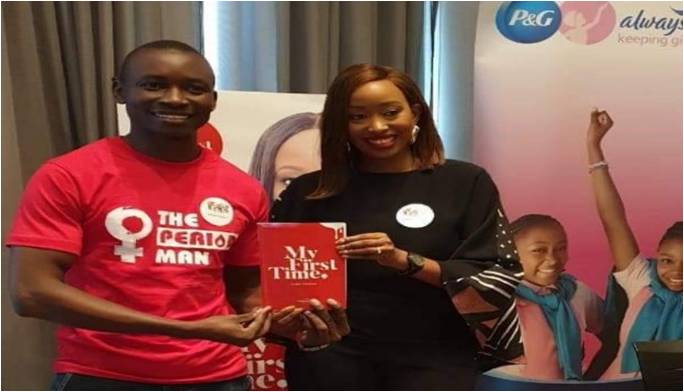
“Because of its mode of application and given the cultural and moral aspects of the community, many parents were worried that this product would ‘take away’ their daughter’s virginity,” Atito said with a grin.
“This is not true,” he stated.
He furthered: “Since most of the skeptics were men, there was need to use men to break the stigma on the cups and educate the community on how it works and its advantages”.
His younger sister being one of the beneficiaries of the cups, Atito’s enthusiasm spiked which led to him doing further research on the topic of menstrual hygiene awareness among young females.
The cups which he says are cost effective, environmentally friendly and more durable than other products currently in the market is today in use by a number of women in Kenya.
Their attempts to tame the community’s ambivalence was far from done but was up on a positive start.
The period man
Branded as a champion of menstrual health in his community, the young advocate landed a contract with the Kenya Red Cross in 2019 to offer training to young women in Turkana County on life skills and sexual human rights.
It is during his time here that he encountered what would later form a crucial part of his history as an advocate of menstrual health.
“When we were in Turkana, one evening as we walked to our sleeping quarters, we came across a group of seven girls seated by the roadside at about 7pm,” Atito narrated.
The girls, who he said were seated on bare eroded ground, were adolescents aged between 13 to 17.
Why are you talking about periods yet you are a man, ‘kwani wewe ni period man’
Atito
On inquiry, Atito’s co-facilitator who had accompanied him mentioned that the girls were menstruating, and according to their culture it was a taboo for them to mix with people while they were in their periods and especially if those homes had men in them.
His companion further added that the girls were also not allowed to touch anything in the home and that their food was also taken to them where they sojourned in the expanse, a revelation that broke the young man’s heart.
As if this was not enough, the dehumanizing culture again reared its head the following day as Atito was furthering the training.
As his training custom was, Atito took out a menstrual cup during the afternoon class much to the enthusiasm of his audience.
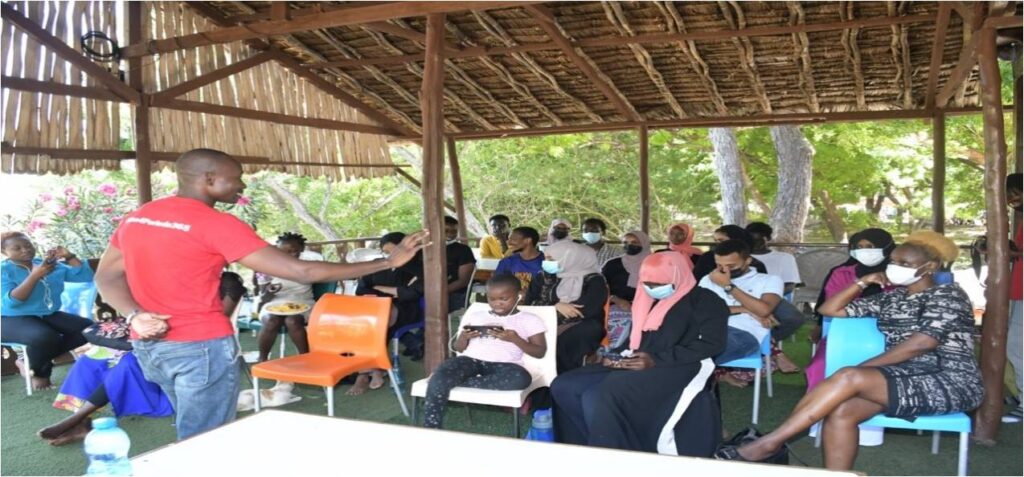
However, as soon as the knowledge of what the item was was made clear, and the awareness of its function sieved through the minds in the room, murmurs and whispers engulfed the room.
There was disbelief and utter wonder written all over the girls’ faces.
“Why are you talking about periods yet you are a man, ‘kwani wewe ni period man’?” a lady asked confidently and ferociously.
Atito knew this topic was well guarded by culture in this community just like some he had encountered but perhaps was getting a firsthand taste of just how deep the roots were.
Apparently, men were not allowed to engage in this topic let alone mention it. It was taboo.
One evening after work, the image of the seven girls hit me and what they go through troubled me. I thought of how I could end the stigma and the taboo notion surrounding menstruation
Atito
At least no one had hinted to him that he would not face some form of fanatical resistance.
Apart from birthing a name for the young advocate; The Period Man; the young lady’s statement also plunged the room into a pool of laughter.
“I was however given a chance to explain and the whole training progressed and concluded without hitches,” Atito said with a smile.
A week after traveling back to Mombasa from his Turkana training, the ghosts of the seven girls haunted the young man into taking action.
“One evening after work, the image of the seven girls hit me and what they go through troubled me. I thought of how I could end the stigma and the taboo notion surrounding menstruation”, he reflected dolefully.
This then became Atito’s official initiation into the realm of menstrual advocacy.
His desire to strongly spark the conversation on menstruation was also driven by the fact that there was no serious advocacy on the issue.
“I scanned the environment and realized that there were advocacies on HIV awareness and family planning but I could not pinpoint any menstrual health champion,” he said with a smile.
It is during this time that he made the choice to be a menstrual health champion.
In his search for a name that would stand out and help spark and push the menstrual conversation, Atito remembered the name given to him by the woman in Turkana.
And so ‘the period man’ was born.
Atito explained that he wanted to be the man who will break the silence on periods.
The international platform
With his new found love growing him into uncharted territories of popularity, new and bigger doors began to open for ‘the period man’.
Atito’s quest to break the menstrual taboo among young women soon became noticed by international organizations and this skyrocketed his fight and awareness creation onto the global platform.
In 2018, before his Turkana trip, he was invited to represent Kenya youths at the European Union conference in Belgium.
This was in Belgium in 2018 at the EU parliament. A trip he confessed changed everything for him.
“I was privileged to get an invite to be part of the consultative meeting between members of the European Union Council and young people to discuss matters menstrual health as part of the Sustainable Development Goals (SDGs) by the United Nations UN,” he narrated with excitement.
Health and well being, education and gender equality were among the SDGs discussed in detail.
A number of recommendations were drafted during the time and were featured in the youth policy of 2021-2030 and drafted by the European parliament as Atito further explained.
The social media
On December 11, 2019, a day the young man remembers quite vividly, he went to his Facebook account and posted: “from today I have gotten myself a name, I’ll be the period man,” he narrated.
This was just a month after his Turkana trip.
A day after his Facebook post, he received an invitation to be part of a mobilization for menstrual products by the Kenya Red Cross.
All these actions and reactions drove Atito to really ponder on how best to utilize the platform he had found himself in and one he seemed to have welcomed whole heartedly.
My main focus was to sensitize men but here I was being buried in a plethora of deep female related questions and concerns
Atito
When he took his advocacy a step higher and started a Facebook page titled ‘The Period Man’ in January 2020, Atito started an online campaign headed ‘men for periods 365’ in which he focused on sensitizing men on menstrual maters.
The one post a day was meant to run for the whole year.
This, he said, was very crucial in breaking the silence on the discussion of periods.
After about two weeks, his posts had started eliciting reactions. Many of his followers who bombarded him with questions on periods were women.
The questions, Atito recalled, ranged from; how best to deal with period pains to which of the sanitary pad brands was the best among others.
This became overwhelming for the young man whose original idea was to sensitize men.
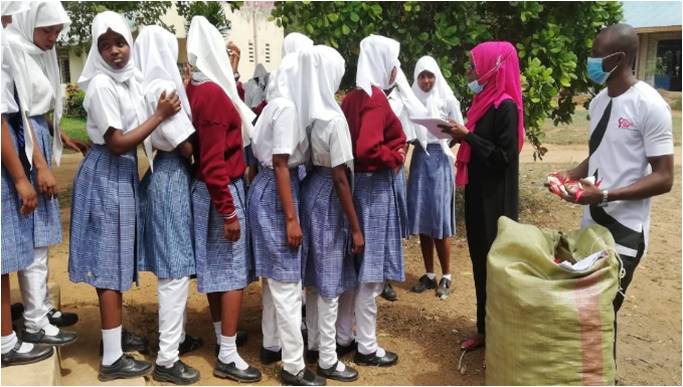
“My main focus was to sensitize men but here I was being buried in a plethora of deep female related questions and concerns,” he said in wonder.
He had to shift focus.
With an increasing number of people interacting with his posts and with his followers growing day by day, the young man knew he was making an impact.
The social media also came with its fair share of challenges as the young man explained.
“An unknown person went to TikTok and opened an account with my stage name ‘the period man’, complete with my information and pictures,” he said with a light laugh coupled with an expression of disbelief.
He was learning firsthand the ups and downs of the digital terrain.
The menstrual museum
In his search for a concept that would help propel the menstrual awareness gospel further, Atito came up with the idea of a Menstrual Health Museum.
This was a one-stop shop for everything menstrual.
When he finally drafted the concept of the menstrual health museum, it became a solid vehicle on which the whole advocacy could anchor on.
When an opportunity arose, Atito sent a proposal, a concept and an abstract to Impact Research and Development Organization (IRDO).
Though his proposal and abstract were not successful, Atito’s concept went through and he managed to become one of the thirty under thirty (30-U-30) awardees by IRDO which also included young people from a number of African countries.
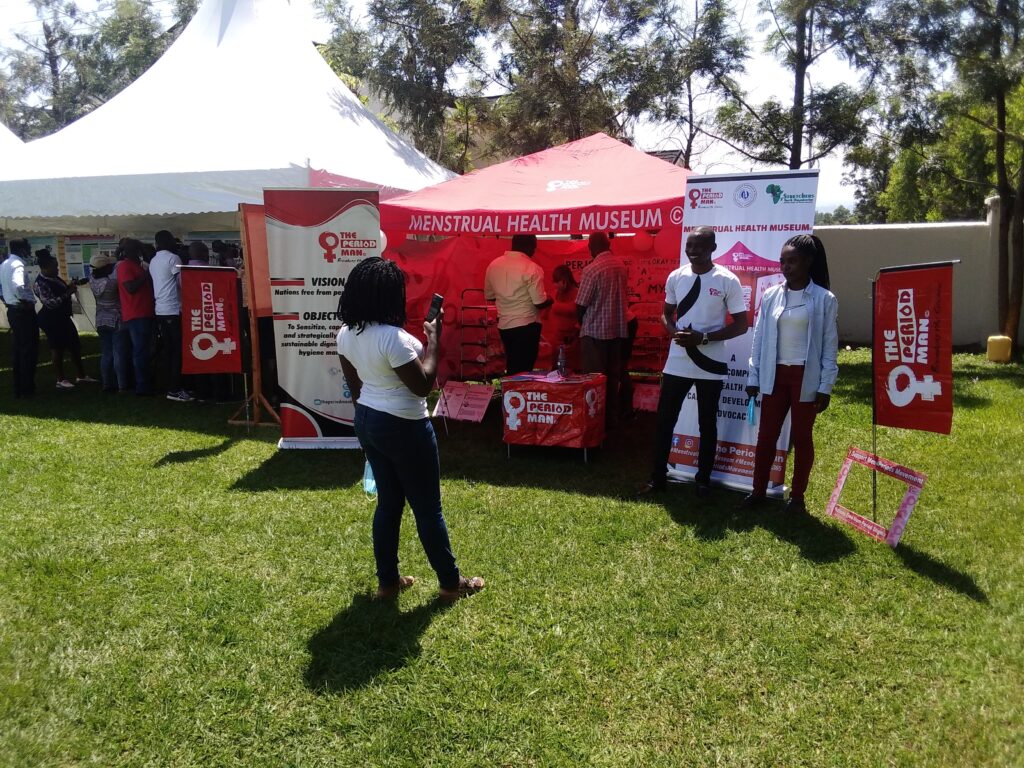
The awardees were trained and mentored in research from concept proposal to implementation.
The findings of which were shared in the Reducing HIV in Adolescents and Youth (RHAY) conference by the youth.
The 2022 five-days RHAY conference in Kisumu is where the menstrual health museum made its debut appearance.
The conference which brought together young people from various African nations including Uganda, Tanzania, South Africa and Rwanda among others was in no doubt a golden opportunity for Atito to share his passion and for people to interact with his one of a kind campaign.
I would like to see a situation where menstrual health as a public health mater and one which many others are founded upon, directly or indirectly, is also given priority and in fact budgeted for
Atito
The young advocate also welcomed invitations from individuals and organizations hosting such health events as he stressed that it is such platforms that help push the awareness agenda.
His menstrual health museum is literally a den of menstrual related paraphernalia including both reusable and non reusable pads, menstrual cups alongside other products and female related information which the women who overwhelmingly thronged the museum during the five day conference definitely found useful.
Fortunately, Atito also prides himself in his second pair of worthy hands that also came in handy during the packed conference.
His better half, 26 year old Sarah Ngome, who he added has been a great gift especially when it comes to handling the female visitors also boldly exhibited passion and commitment.
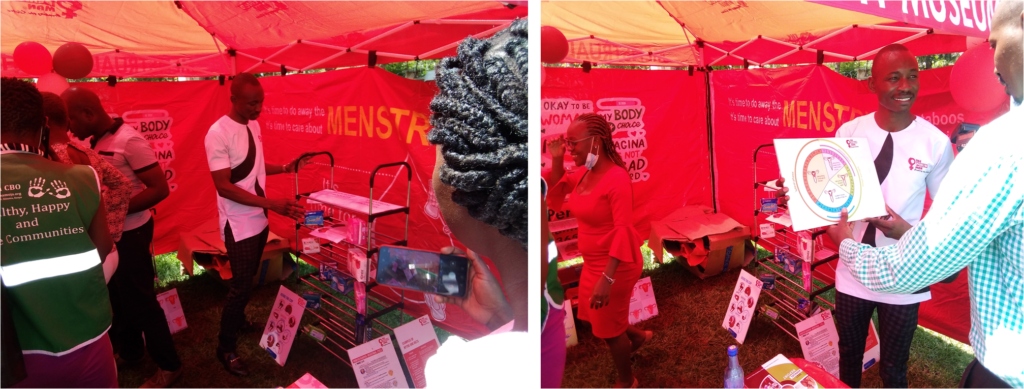
On her part, Ngome said it’s a journey that requires personal effort, passion and dedication.
The portable museum, which Atito adds, is a tool for comprehensive awareness, capacity building and advocacy is one he hopes will grow to have a physical address, probably in integration with the Kenya Museum.
This, he added, would be a great leap towards helping to not only break the silence but to also skyrocket the awareness and sensitization process in the country.
Challenges
In laying bare some of the challenges he faces, Atito did not shy away from stating that most of the resources he channels into his campaigns are his own.
“Most people have the idea that I am well funded in this campaign. Far from the truth I always have to dig from my own pockets to further this course,” he explicated.
Something he says is not possible unless one is passionate and self driven.
He was however grateful that there are brands and organizations like Always and the Kenya Red Cross together with some well wishers who continue to play crucial roles in as far as pushing the campaign is concerned.
This is the reason for sensitization and awareness, it is the more reason we should heighten engagements on the topic and solidify our efforts to break the silence, end the stigma and improve the menstrual health of our girls and women
Atito
He furthered: “Any additional help of any kind from well wishers is highly welcomed”.
Atito also says that menstrual health advocacy seems incomplete without proper policy and frameworks both at the national and county government levels.
“I would like to see a situation where menstrual health as a public health mater and one which many others are founded upon, directly or indirectly, is also given priority and in fact budgeted for”, the young man said.
This, he added, is a big challenge at the moment.
Atito’s biggest challenge perhaps is people who still out of cultural, religious or even social staunchness and influence thwart his interest in the menstrual topic.
“Some people come into my inbox and comment that period is not something for a man to talk about,” he said with a grin.
The negativity being spewed, he says, only act to indicate how much more awareness needs to be created.
“This is the reason for sensitization and awareness, it is the more reason we should heighten engagements on the topic and solidify our efforts to break the silence, end the stigma and improve the menstrual health of our girls and women,” Atito stated with conviction.
